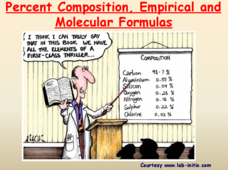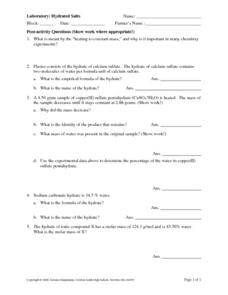Science Geek
Percent Composition, Empirical and Molecular Formulas
Help your pupils understand when empirical becomes molecular. The lesson presentation demonstrates the connection between empirical formulas and molecular formulas. Then, given percent composition, the lesson demonstrates the steps to...
Curated OER
Laboratory: Hydrated Salts
In this hydrated salt worksheet, learners answer questions after completing a lab experiment using a hydrated salt. The calculate the empirical formula for the hydrate, they name the hydrate and they determine the mass of the water in...
Curated OER
Understanding Behavior of Gases
If you want your young chemists to fully grasp the behavior of gases, here is an all-inclusive lesson plan. It provides handouts of detailed instructions for three laboratory activities, assessment reccomendations, and a list of...
Virginia Department of Education
Matter and Energy: Equations and Formulas
Using simple materials, an informative lesson demonstrates the Law of Conservation of Matter and explains how to balance chemical equations. Young chemists perform experiments, analyze reactions, and balance chemical equations on their...
Royal Society of Chemistry
Chemistry Masterclass—Chemistry Outreach
Immerse your chemistry class in the world of organic chemistry! Science scholars isolate acetaminophen from an over-the-counter sample during an intense and interesting lab. Groups use many different separation and analysis techniques to...
Curated OER
Target Earth
Space scientists use water displacement to determine the mass of a cubic centimeter mini meteorite, and then use it as a small-scale representative of an asteroid. They figure out the orbital velocity of an asteroid. Then they use a...
Curated OER
Lactose & Lactase
Students examine the characteristics of lactose and lactase. In this enzyme lesson students study the lactose in milk and its rate of dissolution.
University of Nebraska
University of Nebraska: Determining a Molecular Formula
This is a seven part site from the University of Nebraska on molecular formulas. Sections are: Introduction, Purpose, General Safety Considerations, Procedure, Data Analysis and Concept Development, Implications and Applications,...









